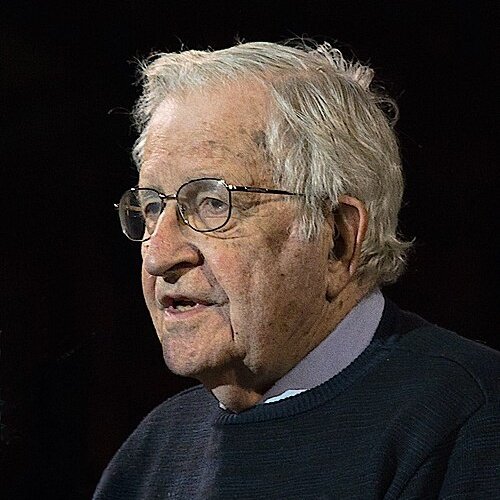Noam Chomsky's Book Recommendations
Noam Chomsky, born December 7, 1928, is an influential American linguist, philosopher, cognitive scientist, historian, and social critic. He revolutionized the field of linguistics with his theory of generative grammar, particularly through his seminal work, "Syntactic Structures" (1957). Chomsky's contributions extend beyond linguistics to political activism, where he is known for his critiques of U.S. foreign policy and media, encapsulated in works like "Manufacturing Consent" (1988). As a professor emeritus at MIT, his interdisciplinary approach has significantly impacted cognitive science, philosophy of language, and political thought. Chomsky remains a prolific author and speaker, continuing to shape academic and public discourses.

Start Listening to Book Summary
Books in the Collection
Voices of a People's History of the United States, 10th Anniversary Edition
Howard Zinn, Anthony Arnove
Showing 8 of 64 books in this collection
Book Summaries
The Wealth of Nations Book Summary
In 'The Wealth of Nations', Adam Smith unveils the intricate dynamics of economics and its impact on society. He argues that free markets, driven by individual self-interest, can lead to unprecedented prosperity. Smith introduces the concept of the 'invisible hand,' suggesting that personal ambitions can benefit the collective good. This groundbreaking work lays the foundation for modern economics, challenging prevailing mercantilist ideas. Dive into Smith's insights to uncover how economic forces shape our world and influence our everyday lives.
Out of Control Book Summary
In 'Out of Control,' Kevin Kelly explores the complexities and unpredictability of modern technology and its impact on society. He introduces the idea of 'self-organization,' revealing how systems—natural and artificial—can evolve beyond our control. This thought-provoking narrative challenges our understanding of technology's role, suggesting that chaos can lead to new forms of order. As we navigate an increasingly automated future, Kelly prompts us to reconsider our relationship with the machines we create. Are we the architects of a brave new world, or are we ceding power to forces we can’t fully comprehend?
The Great Transformation Book Summary
In 'The Great Transformation,' Karl Polanyi explores the radical shifts in economic and social structures that shaped modern society during the Industrial Revolution. He argues that the rise of the market economy led to profound disruptions in community life and environmental balance. Polanyi challenges the notion of self-regulating markets, revealing the hidden social costs of laissez-faire capitalism. Through historical examples, he illustrates the tension between economy and society, emphasizing the need for protective measures. This thought-provoking work invites readers to reconsider the relationship between markets and social welfare in contemporary life.
Voices of a People's History of the United States, 10th Anniversary Edition Book Summary
In 'Voices of a People's History of the United States,' Howard Zinn and Anthony Arnove present a powerful anthology that amplifies the voices often silenced in mainstream narratives. This 10th Anniversary Edition delves into the stories of marginalized communities, offering a profound insight into the struggles and triumphs of the American populace. Featuring riveting accounts from laborers, activists, and everyday citizens, the book challenges conventional historical perspectives. Each narrative serves as a reminder of the resilience of the human spirit and the continuous fight for justice. Discover the untold stories that shape the fabric of America and provoke thought about the narratives we accept.
Democracy at Work Book Summary
In 'Democracy at Work', Richard D. Wolff challenges the conventional notions of democracy and the workplace, advocating for a radical transformation where workers have a say in their enterprises. Through compelling arguments and real-world examples, he explores the failures of capitalism and presents a vision for a more just and equitable economic system. Wolff introduces the idea of worker cooperatives as a feasible alternative, illustrating how they can empower employees and foster true democratic practices. This thought-provoking book urges readers to reconsider their understanding of democracy beyond the confines of politics and into the very fabric of their daily work lives. Are we ready to rethink who really holds the power in the workplace?
Interventions Book Summary
In 'Interventions,' Kofi Atta Annan shares riveting insights from his tenure as the UN Secretary-General, unraveling the complexities of global diplomacy and humanitarian crises. Co-authored by Nader Mousavizadeh, the book offers a candid exploration of critical international interventions in the realms of conflict, peacekeeping, and development. Annan's personal anecdotes and reflections challenge conventional narratives, inviting readers to ponder the moral dilemmas faced by world leaders. With a blend of personal and political history, the text reveals the intricate dance between power, responsibility, and human rights on the global stage. Prepare to be captivated by Annan's vision for a more just and united world.
Condemned to Repetition Book Summary
In 'Condemned to Repetition,' Robert A. Pastor explores the intricate web of U.S.-Latin American relations, unveiling a pattern of historical interventions that continues to shape modern dynamics. With a keen eye for detail, Pastor argues that past mistakes are often repeated, compelling readers to reflect on the cyclical nature of diplomacy. Through vivid storytelling and critical analysis, he reveals how these actions have led to disenchantment and unrest in the region. This thought-provoking work encourages a reevaluation of foreign policy and its far-reaching impacts. Will the U.S. break the cycle of repetition, or is it doomed to repeat its history?
Arguing about War Book Summary
In 'Arguing about War,' Michael Walzer delves into the ethical complexities surrounding conflict and warfare, challenging traditional justifications for war. Through thought-provoking analysis and compelling historical examples, he questions whether moral principles can truly be upheld in the chaos of battle. Walzer invites readers to ponder the weight of political responsibility and the consequences of intervention. His exploration of just war theory ignites debate on the morality of military action, making us confront uncomfortable truths about human nature. Engage with this critical discourse and discover how morality and war intersect in ways that will reshape your understanding of global conflicts.

















